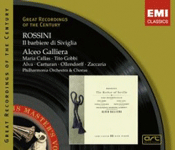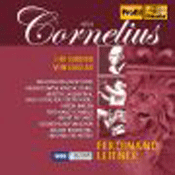
26 Apr 2009
Barbers in Baghdad and Seville
Razor-wielding rascals involve themselves in romantic complications in the two sets considered here, with a fine performance of a rarity and an even finer performance of a classic.
English Touring Opera are delighted to announce a season of lyric monodramas to tour nationally from October to December. The season features music for solo singer and piano by Argento, Britten, Tippett and Shostakovich with a bold and inventive approach to making opera during social distancing.
This tenth of ten Live from London concerts was in fact a recorded live performance from California. It was no less enjoyable for that, and it was also uplifting to learn that this wasn’t in fact the ‘last’ LfL event that we will be able to enjoy, courtesy of VOCES8 and their fellow vocal ensembles (more below …).
Ever since Wigmore Hall announced their superb series of autumn concerts, all streamed live and available free of charge, I’d been looking forward to this song recital by Ian Bostridge and Imogen Cooper.
The Sixteen continues its exploration of Henry Purcell’s Welcome Songs for Charles II. As with Robert King’s pioneering Purcell series begun over thirty years ago for Hyperion, Harry Christophers is recording two Welcome Songs per disc.
Although Stile Antico’s programme article for their Live from London recital introduced their selection from the many treasures of the English Renaissance in the context of the theological debates and upheavals of the Tudor and Elizabethan years, their performance was more evocative of private chamber music than of public liturgy.
In February this year, Albanian soprano Ermonela Jaho made a highly lauded debut recital at Wigmore Hall - a concert which both celebrated Opera Rara’s 50th anniversary and honoured the career of the Italian soprano Rosina Storchio (1872-1945), the star of verismo who created the title roles in Leoncavallo’s La bohème and Zazà, Mascagni’s Lodoletta and Puccini’s Madama Butterfly.
Evidently, face masks don’t stifle appreciative “Bravo!”s. And, reducing audience numbers doesn’t lower the volume of such acclamations. For, the audience at Wigmore Hall gave soprano Elizabeth Llewellyn and pianist Simon Lepper a greatly deserved warm reception and hearty response following this lunchtime recital of late-Romantic song.
Collapsology. Or, perhaps we should use the French word ‘Collapsologie’ because this is a transdisciplinary idea pretty much advocated by a series of French theorists - and apparently, mostly French theorists. It in essence focuses on the imminent collapse of modern society and all its layers - a series of escalating crises on a global scale: environmental, economic, geopolitical, governmental; the list is extensive.
For this week’s Live from London vocal recital we moved from the home of VOCES8, St Anne and St Agnes in the City of London, to Kings Place, where The Sixteen - who have been associate artists at the venue for some time - presented a programme of music and words bound together by the theme of ‘reflection’.
'Such is your divine Disposation that both you excellently understand, and royally entertaine the Exercise of Musicke.’
Amongst an avalanche of new Mahler recordings appearing at the moment (Das Lied von der Erde seems to be the most favoured, with three) this 1991 Mahler Second from the 2nd Kassel MahlerFest is one of the more interesting releases.
‘And there was war in heaven: Michael and his angels fought against the dragon; and the dragon fought and his angels, And prevailed not; neither was their place found any more in heaven … that old serpent … Satan, which deceiveth the whole world: he was cast out into the earth, and his angels were cast out with him.’
If there is one myth, it seems believed by some people today, that probably needs shattering it is that post-war recordings or performances of Wagner operas were always of exceptional quality. This 1949 Hamburg Tristan und Isolde is one of those recordings - though quite who is to blame for its many problems takes quite some unearthing.
There was never any doubt that the fifth of the twelve Met Stars Live in Concert broadcasts was going to be a palpably intense and vivid event, as well as a musically stunning and theatrically enervating experience.
‘Love’ was the theme for this Live from London performance by Apollo5. Given the complexity and diversity of that human emotion, and Apollo5’s reputation for versatility and diverse repertoire, ranging from Renaissance choral music to jazz, from contemporary classical works to popular song, it was no surprise that their programme spanned 500 years and several musical styles.
The Academy of St Martin in the Fields have titled their autumn series of eight concerts - which are taking place at 5pm and 7.30pm on two Saturdays each month at their home venue in Trafalgar Square, and being filmed for streaming the following Thursday - ‘re:connect’.
The London Symphony Orchestra opened their Autumn 2020 season with a homage to Oliver Knussen, who died at the age of 66 in July 2018. The programme traced a national musical lineage through the twentieth century, from Britten to Knussen, on to Mark-Anthony Turnage, and entwining the LSO and Rattle too.
With the Live from London digital vocal festival entering the second half of the series, the festival’s host, VOCES8, returned to their home at St Annes and St Agnes in the City of London to present a sequence of ‘Choral Dances’ - vocal music inspired by dance, embracing diverse genres from the Renaissance madrigal to swing jazz.
Just a few unison string wriggles from the opening of Mozart’s overture to Le nozze di Figaro are enough to make any opera-lover perch on the edge of their seat, in excited anticipation of the drama in music to come, so there could be no other curtain-raiser for this Gala Concert at the Royal Opera House, the latest instalment from ‘their House’ to ‘our houses’.
"Before the ending of the day, creator of all things, we pray that, with your accustomed mercy, you may watch over us."

Razor-wielding rascals involve themselves in romantic complications in the two sets considered here, with a fine performance of a rarity and an even finer performance of a classic.
From the archives of the Cologne Radio — aka, Westdeutscher Rundfunk Köln — Profil has rescued a 1974 performance of Peter Cornelius’s Der Barbier von Bagdad. A protégé of Franz Liszt, Cornelius both benefited and suffered from the great man’s influence. Liszt promoted Cornelius’s work and conducted the premiere of his comic opera in 1858. However, by that point Liszt had already made a fair number of enemies, and they came to hiss down both the conductor and the opera of Cornelius. Only long after Cornelius’s death did his opera find some audiences, although it has never really threatened to enter the standard repertory.
 Lothar Brandt, the author of the German program note which J & M Berridge translated into English, takes the interesting tack of arguing that the very old-fashionedness of both Cornelius’s music and the libretto makes Der Barbier von Bagdad “cool.” Cornelius barely makes any effort to introduce any “Oriental” aspects to his pleasant, very conservative score, and the story is a harmless bauble, adapted from The Arabian Nights. Apparently Brandt sees the opera as so “uncool,” it is “cool.” Maybe. It would take a ripping tune or two to make the score more memorable. With no texts provided, judging the success of the work dramatically will elude the non-German speaker. However, most of the scenes seem to have relatively little character interaction, and the comic energy that percolates throughout Rossini’s masterpiece on the “barber” theme raises not a crackle here.
Lothar Brandt, the author of the German program note which J & M Berridge translated into English, takes the interesting tack of arguing that the very old-fashionedness of both Cornelius’s music and the libretto makes Der Barbier von Bagdad “cool.” Cornelius barely makes any effort to introduce any “Oriental” aspects to his pleasant, very conservative score, and the story is a harmless bauble, adapted from The Arabian Nights. Apparently Brandt sees the opera as so “uncool,” it is “cool.” Maybe. It would take a ripping tune or two to make the score more memorable. With no texts provided, judging the success of the work dramatically will elude the non-German speaker. However, most of the scenes seem to have relatively little character interaction, and the comic energy that percolates throughout Rossini’s masterpiece on the “barber” theme raises not a crackle here.
Ferdinand Leitner, seemingly motivated by a sincere love for the music, gives it first-class treatment, along with an excellent cast. Hans Sotin brings comic flair to the title role, and as the requisite young lovers, Helen Donath and Horst R. Laubenthal make a sweet pair. The sound is clean. Profil needs to stop providing track listings only on the back of the jewel cases, a user-unfriendly arrangement.
EMI Classics, meanwhile, reissues in its Great Recordings of the Century series the Callas/Gobbi Il barbiere di Siviglia, conducted by Alceo Galliera. The opera has a rich recording history, but this set is special, mostly thanks to its two stars. Not everyone appreciates Gobbi’s vocal gifts, which can tend to the dry side, but his ability to characterize as he sings is unparalleled. This Figaro works his wiles with cunning charm.
And not everyone always appreciates Maria Callas, either, but here she is everything her besotted admirers claim her to be. The voice is steady, alluring, distinctive. She has full technical control of every aspect of the score. Even her somewhat calculated effects, like the ostentatiously delayed delivery of that “ma” in “Una voce poco fa,” can be tied to the character of Rosina, a young lady far smarter and in control that is sometimes portrayed. Callas easily posses center stage when her solo turns come, and just as importantly, she easily rejoins the ensemble as necessary too. For her alone, the recording earns its “GROTC” label.
Luigi Alva sings sweetly enough, although the arias don’t quite pull together. The tone eerily brings to mind at times today’s leading exponent of Almaviva, Juan Diego Florez.
Conductor Galliera supports the singers to the point of indulgence. The end of act one brings the best of his efforts, with a very theatrical, vivacious reading. Some other spots feel more studio-bound. The remastering is excellent, and EMI provides a very nice booklet, slim and yet with a bilingual text.
So the Cornelius makes for an amiable byway, and the Callas/Gobbi makes a well-trod path fresh again. Go which way you please, reader.
Chris Mullins